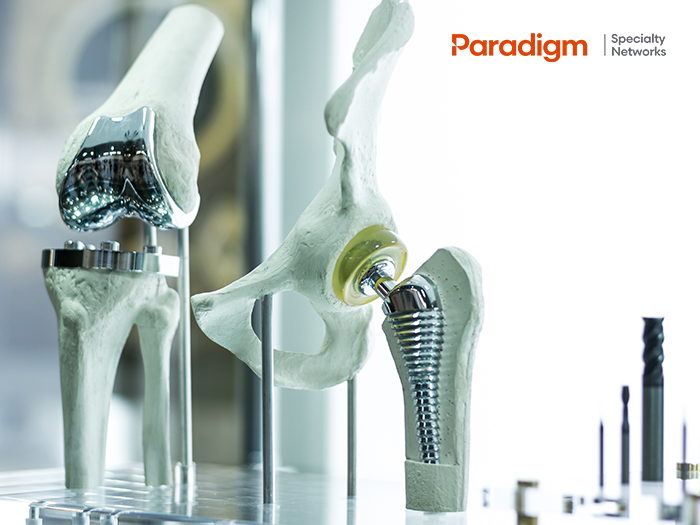Sponsored Content by Paradigm
Robust Data and Real Experience — Mastering Logic for Implant Reimbursement

Surgical implants bring tremendous benefits to patients and are vital to help injured workers regain their health. And while positive patient outcomes are always the top priority, payers must also pay close attention to realistic implant costs based on clean and thorough data.
Did you know that implant charges on average account for almost a quarter of the total surgical bill?
Even more staggering for high acuity cases including multi-level spinal fusion and pain cases, this number can skyrocket to well over 50%. This equates to over $3.2 billion in annual workers’ compensation medical spend, making implants a significant cost driver.
Interpreting an injured worker’s surgical bill can be challenging for many payers. It’s no surprise that implant pricing is complex and can often seem unpredictable. It is influenced by many factors including wholesale cost, state law, surgical practice, and implant design — just to name a few.
In today’s market, standard bill review tools and subjective negotiation tactics are the common approaches to reimbursing implant bills, despite their complexity.
So, how do you determine the fair and accurate price of an implant with so many variables to consider? Our team has mastered this logic.
Paradigm Specialty Networks uses a sophisticated surgical implant cost management platform that pinpoints the unbiased reimbursement value of an implant based on verifiable data.
The platform logic is based on evidence from more than $1.3 billion implant charge data points reviewed over the last seven years. This approach considers every element of a surgical implant procedure, making Paradigm’s reimbursement methodology unrivaled.
Fusion, Paradigm’s proprietary platform, processes each bill line by line through objective and verifiable criteria, which then triggers an in-depth review of potential over-billing.
Fusion combines data and intelligence with deep industry insights to understand the many nuances that impact the variability of implant pricing. By capturing this data and applying the Fusion savings modules, Paradigm provides a forensic bill audit that reduces the amount payers reimburse for implants.
“We leverage our industry-leading platform and unrivaled expert oversight to realize incredible and defendable results,” said Kenneth Hannigan, CEO, Paradigm Specialty Networks.
“The facts are compelling. We have comprehensive wholesale pricing data coupled with team members who have first-hand operating room experience and experts with surgical implant supply chain knowledge. We also rigorously follow industry standards and state fee schedules.”
The payoffs of verifiable and defensible data

Kenneth Hannigan CEO, Paradigm Specialty Networks
Each month, hundreds of new implants are introduced into the market, older models are updated, and some are recalled by manufacturers. Keeping track of these details, as well as determining what each manufacturer charges, is a heavy lift for most payers.
The Fusion platform has the ability to adapt to new industry data and account for this information quickly.
“We rebuild every implant surgery, from the ground up, based on thousands of data points we’ve collected over the years. The result is a reimbursement value that is verifiable and unparalleled,” said Gus Tschaar, Chief Bill Review Officer, Paradigm Specialty Networks.
Data integrity is strength
Fusion is updated in real-time, continually capturing new items and cost changes. Each implant contains multiple components: plates, screws, brackets, pins, etc.
There are different manufacturers and generic versions, and each state has its own regulations. The wealth of information makes an enormous difference during the bill review process, and Fusion can easily process all of the moving elements.
“For example, titanium plates are common during implant procedures and can be sourced from various manufacturers,” said Hannigan.
“You need authentic data to verify a plate from each vendor so that ‘if / then’ statements can be created. We have reviewed more than 100,000 bills, and that gives us an empirical edge. We can create a bill of materials right down to the serial numbers for the items—it has to be that specific.”
The human touch
Software alone cannot provide this level of detail.
In-depth reviews of complex bills require subject matter experts who have intimate domain knowledge. The Paradigm team brings impressive expertise and real operating room experience to the process. Auditors regularly observe surgeries, and many are practicing surgical techs, giving them real-life experience to validate invoices.
“You can’t replace the human touch,” said Tschaar.
On a system level, this accrued knowledge gives Paradigm Specialty Networks unique insights that no one else in the industry can provide. The group tracks physician and facility billing practices and revision rates.
Auditors can also detect when a provider is practicing counter-to-industry norms — for example, when a provider bills for ancillary disposable items as an implantable item or submits a bill for an entire kit when only a single item is used. Our auditors also conduct ongoing FDA recall checks to update the Fusion database, ensuring clients don’t pay for replacement items.
Knowledge reduces costs, increases efficiency
These dynamic reviews expedite the claims process and reduce costs.
Paradigm looks at each implantable device line item, identifies the appropriate cost, applies the right state regulations, and forwards a comprehensive Explanation of Review (EOR) to the payer and provider, expediting the bill review process and efficiently moving claims forward.
On average, Paradigm Specialty Networks saves our clients between 60-70% on each implant bill.
The EOR lists the items that were actually used, which are eligible for reimbursement, and how much they should be reimbursed.
The explanations are completely transparent—so payers and providers fully understand how each reimbursement was calculated.
“We are the experts at managing this process and know the true costs,” said Hannigan.
“We stand behind each reduction, every single time, regardless of the many factors involved. It’s more than just the details on the bill. It’s knowing everything that went into creating that bill: What was used? What type of facility? What were the total costs? When everything is factored in, the honest reimbursement value is impressive.”
To learn more, visit https://www.paradigmcorp.com/specialty-networks/.
This article was produced by the R&I Brand Studio, a unit of the advertising department of Risk & Insurance, in collaboration with Paradigm. The editorial staff of Risk & Insurance had no role in its preparation.










